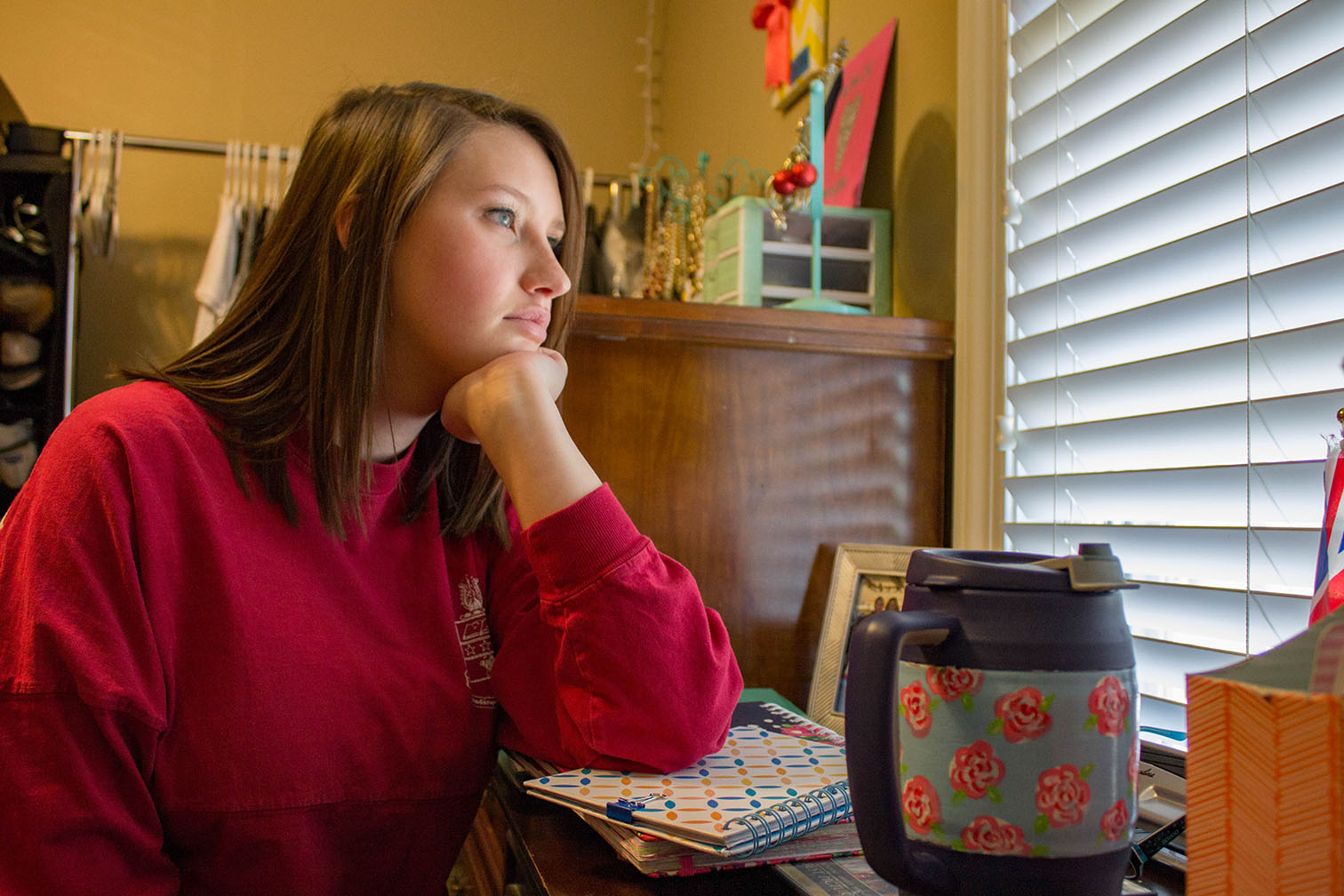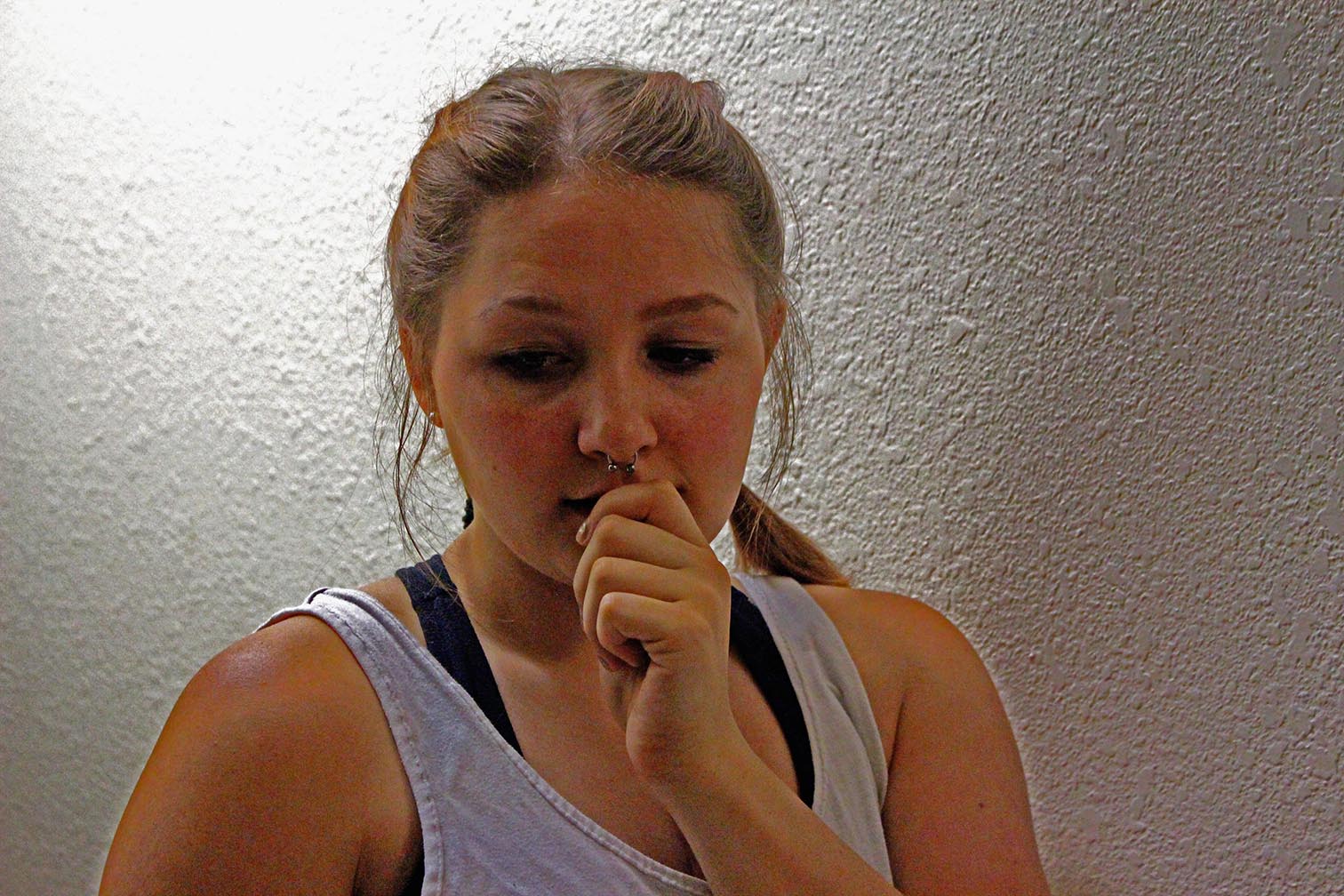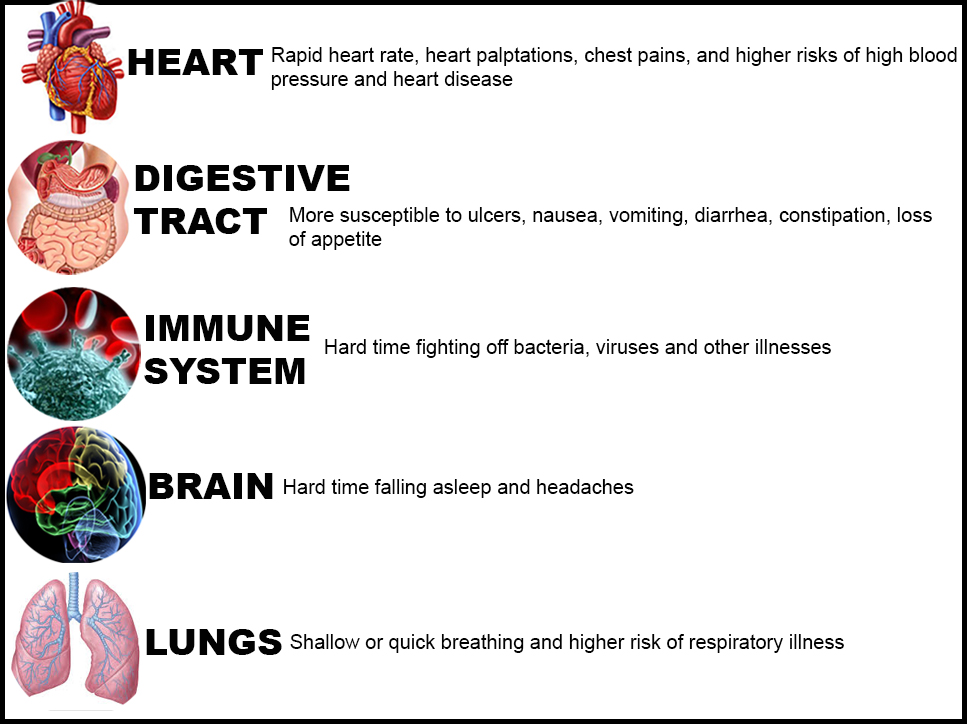"I get this feeling inside of me like everybody is judging me."
- Freshman Mary Allyson FryDuring college, students experience many firsts, including new lifestyle, friends, roommates, cultures and ways of thinking. This transition often creates stressors that contribute to anxiety. The American College Health Association estimates that approximately one in six college students has been diagnosed with or treated for anxiety. A few Baker students agreed to share their stories of anxiety.
| Caylea Syler: Phobias | Nia Madison: Social Anxiety |
| Krista Porter: PTSD | Anna Stumpf: OCD |
| Dory Smith: Generalized Anxiety | Health Effects of Anxiety |
Phobias: Caylea Syler

Photo by Lexi Loya
Sometimes she can feel it on her arm, leg, back, neck and hair. She wants to dig a hole into her arm, trying to scratch it away, but it’s not really there.
Junior Caylea Syler experiences anxiety when she thinks about a tiny parasite like a tick.
“I try not to talk about them or encounter them because it’s awful when that happens,” she said.
The actual feeling of an arachnid crawling on your skin can be eerie for many people, but Syler automatically assumes the worst will happen if she does come into contact with a tick.
“You don’t notice them and they suck all your blood and you die or get a disease,” she said. “Something bad can happen.”
Syler admits to having extreme anxiety attacks that typically bring her to tears.
“It’s like getting upset and you can’t stop crying. I could start crying right now just thinking about them,” Syler said. “I get hysterical, and because I’m crying so hard I have trouble breathing.”
Those who suffer from phobias typically don’t think realistically, and they create worse scenarios and issues for themselves. During her anxiety attacks, Syler eventually adjusts her way of thinking and is able to calm herself down.
“Halfway through I’ll realize that everything is going to be OK,” she said. “But my immediate response is to freak out so I have to get some air and figure it all out.”
Syler doesn’t have her phobia of ticks completely solved, but the best advice she could give is to find a comfort zone when the anxiety gets hard to handle.
“There’s nothing I can do about the fact that ticks upset me,” she said. “But it’s good to find something that grounds you and makes you feel less anxious.”
While most of us are able to control our fears and continue with our everyday lives, in extreme cases we may feel intense threat or danger and go out of our way to avoid specific objects, places or situations. We may eventually become immediately stressed at the mere thought of our specific phobia.
Symptoms
• Sweating
• The need to escape
• Fear of dying
• Feeling of losing control or doom
Treatment
Cognitive behavioral therapy is the main treatment for those who have phobias.
Source: Anxiety and Depression Association of America
Social Anxiety: Nia Madison

Photo by Khadijah Lane
"My brain is just running with thoughts that aren't my own thoughts. I'm too busy thinking about what other people are thinking about, or trying to guess what they're thinking about."
-Nia Madison
The teacher calls your name. You walk in front of the class and began your presentation with 30 set of eyes staring at you. What are they thinking? You can hear your heartbeat as your body starts to tremble. Your are experiencing anxiety. Unfortunately, many of us experience these feelings every time we step into a room with others. Social anxiety is the fear of being judged by others in social situations. It can be mistaken for shyness, but people who suffer from social anxiety may have a difficult time properly functioning in daily life. Many feel like they are being watched or will humiliate themselves no matter what they do in front of others. About 15 million American adults have social anxiety disorder.
Symptoms
• Sweating
• Trembling
• Nausea
• Feeling of attachment and loss of self control
Treatment
Talk therapy and antidepressants can help increase people’s confidence and improve their ability to interact with others in social situations.
Source: Anxiety and Depression Association of America
PTSD: Krista Porter

Photo by Khadijah Lane
Car accidents can be a traumatic experience and can affect one’s ability to comfortably drive not only in big areas but places as small as Baker University. Sophomore Krista Porter has been experiencing post traumatic stress disorder for four months after her first car accident on the Baker campus.
“I was backing up a little bit and I looked back and didn’t see anyone so I kept backing up,” she said. “But then I hit a guy pretty hard and it really scared me because I wasn’t expecting it.”
When she realized she hit another car, she immediately panicked and experienced shock.
“I didn’t really see what happened, so the anticipation scared me,” she said. “The first 45 seconds after I hit him, I didn’t know what to do or say so I just sat there freaking out.”
After an accident, one may begin shaking uncontrollably or spacing out. When she finally got out of her car, she saw the damage and was unable to properly speak due to her entire body trembling.
“I couldn’t control my shakes. My speech and my vision were really blurry,” she said.
Since the accident, Porter has found it particularly difficult to park on the Baker campus.
“I get really scared especially when I’m backing up now,” she said.
Although she knows no one is near her car, Porter says her heart always starts beating rapidly because of the fear of another accident.
Individuals who have PTSD tend to avoid the situation that caused it, which alters their normal daily activities.
Months later, Porter avoids backing into parking spots and now she excessively checks for cars.
“I just try to avoid backing up mostly because that makes me feel a little better even though I’m still going crazy," she said. "I don't pull off unless I know for sure there aren't any cars coming."
Knowing that she can’t completely avoid parking lots has made getting through PTSD easier for Porter so she always tries to mentally prepare herself for the better.
“I always breathe and tell myself that I’m not going to get into an accident,” she said. “Everything is going to be fine.”
PTSD occurs in individuals who have experienced or witnessed any disastrous or life-threatening event. Although most people who experience these events eventually recover from the trauma, they tend to be depressed and experience anxiety throughout the months or years after the event. More than 7 million Americans age 18 and older have PTSD
Symptoms
• Re-experiencing the trauma through intrusive distressing recollections of the event, flashbacks, and nightmares
• Emotional numbness and avoidance of places, people and activities that are reminders of the trauma
• Increased arousal such as difficulty sleeping and concentrating, feeling jumpy and being easily irritated or angered
Treatment
Psychotherapy such as cognitive behavioral therapy (CBT) and medications are the main forms of treatment.
Source: Anxiety and Depression Association of America
OCD: Anna Stumpf

Photo courtesy of Anna Stumpf
"I couldn’t touch anything because the fear of my fingerprints being on anything, or anyone else’s on anything, just completely drove me nuts."
-Anna Stumpf
OCD takes place when we have unwanted thoughts that we can’t get rid of, resulting in our performing ritualistic behaviors and routines to reduce our anxiety.
Symptoms
• Excessive concern with order, arrangement or symmetry
• Preoccupation with losing or throwing away objects with little or no value
• Doubting that is irrational or excessive
• Repeating a name, phrase or activity
Treatment
OCD can be treated like many other types of anxiety by talk therapy and medications.
Source: Anxiety and Depression Association of America
Generalized Anxiety: Dory Smith

I created this project partly for myself. I also occasionally suffer from anxiety and it has affected my life in more ways than I want to admit. Sometimes I can't control my thoughts or feelings because they attack me all at once. I don't have any answers. I don't know what I'm feeling. But I feel. I feel everything.
Generalized Anxiety Disorder is characterized by consistent and unrealistic concern about everyday activities. Individuals typically expect the worst out of every situation even if they have no reason to be concerned. Although many of us experience usual stress about finances or family, people with GAD have a hard time finding any ease. GAD affects 6.8 millions adults, or 3.1 percent of the population. The risk of getting GAD is highest between childhood and middle age but can begin at any age. The cause of GAD is unknown but biological and life experiences are possible factors.
Symptoms
• Easily fatigued
• Irritability
• Muscle Tension
• Difficulty concentrating
• Sleep disturbance
• Feeling on edge
Treatment
GAD is treatable with cognitive behavioral therapy to help individuals connect with their thoughts and thought patterns. Many who suffer from GAD take medication to help calm them down.
Source: Anxiety and Depression Association of America
How Does Anxiety Affect Your Health?
People who suffer from anxiety understand the impact it can have on their daily lives. Typical symptoms include tense muscles, dry throat, skin issues, or headaches, but when anxiety is severe and untreated, it can have a more serious negative impact on overall health. On the surface, it seems that anxiety is only a mental issue, but over time it can affect your entire body and essentially make your anxiety worse.

Campus Resource
Students seeking counseling for anxiety can visit or call (785.594.8409) the Baker University Health and Counseling Center at 519 Grove Street. Tim Hodges (tim.hodges@bakeru.edu) is the director of the center.
Additional Links
